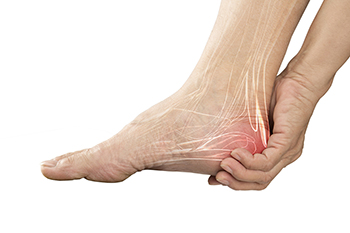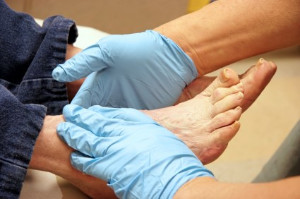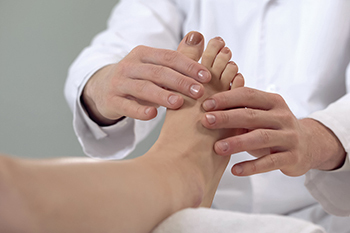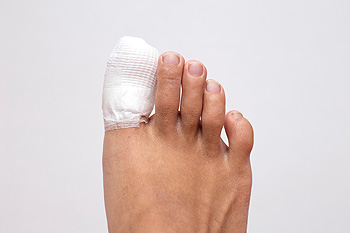






Plantar fasciitis is the most common cause of heel pain. This condition is the inflammation of the tough band of tissue, called the plantar fascia, that runs along the sole of the foot from toes to heel. This tissue helps support the arch and plays an important role in foot mechanics when walking. Causes of plantar fasciitis include standing or walking for long periods, heel spurs, pregnancy, and obesity. Wearing shoes with little or no cushioning in the heel and sole, as well as walking barefoot, may also contribute to the inflammation. The pain of plantar fasciitis is usually a stabbing sensation, felt most in the heel. It tends to be worse upon awakening or after prolonged activity. When pressure is placed on the arch of the foot, pain increases. A feeling of tightness in the calf muscles is another indicator of plantar fasciitis. Luckily, there are a number of remedies for plantar fasciitis. For more information, please make an appointment with a podiatrist.
Plantar fasciitis can be very painful and inconvenient. If you are experiencing heel pain or symptoms of plantar fasciitis, contact one of our podiatrists from Active Foot and Ankle Care, LLC. Our doctors can provide the care you need to keep you pain-free and on your feet.
What Is Plantar Fasciitis?
Plantar fasciitis is the inflammation of the thick band of tissue that runs along the bottom of your foot, known as the plantar fascia, and causes mild to severe heel pain.
What Causes Plantar Fasciitis?
How Can It Be Treated?
While very treatable, plantar fasciitis is definitely not something that should be ignored. Especially in severe cases, speaking to your doctor right away is highly recommended to avoid complications and severe heel pain. Your podiatrist can work with you to provide the appropriate treatment options tailored to your condition.
If you have any questions please feel free to contact our offices located in Fair Lawn, Riverdale, and Englewood, NJ . We offer the newest diagnostic and treatment technologies for all your foot and ankle needs.

One of the chief symptoms of diabetes is chronic foot pain, which is common to most people with this disease. Three major causes of diabetic foot pain are nerve problems, circulatory problems, and infections. A condition known as peripheral neuropathy is the result of damage to the nerves that supply blood to the lower legs, feet, and toes. Specific to diabetics is sensory neuropathy, which results in extra sensitivity to pain in these areas. The diabetic may also experience a loss of sensation in this part of the body that contributes to the cracking and drying of the skin. Another cause of chronic foot pain is peripheral artery disease (PAD). This is the result of sustaining high levels of blood sugar that can clog the arteries and capillaries and slow the flow of blood to the feet and toes. The third most common cause of diabetic foot pain is infections. The diabetic is highly susceptible to infection from sores, cracks, and cuts. Because it is difficult to feel them when they occur, they often go unnoticed. Further, PAD makes it more difficult for these injuries to heal, causing ulcers and other more serious problems. If you are a diabetic and have chronic foot pain, please make an appointment with a podiatrist for an exam and diagnosis.
Diabetic foot care is important in preventing foot ailments such as ulcers. If you are suffering from diabetes or have any other concerns about your feet, contact one of our podiatrists from Active Foot and Ankle Care, LLC. Our doctors can provide the care you need to keep you pain-free and on your feet.
Diabetic Foot Care
Diabetes affects millions of people every year. The condition can damage blood vessels in many parts of the body, especially the feet. Because of this, taking care of your feet is essential if you have diabetes, and having a podiatrist help monitor your foot health is highly recommended.
The Importance of Caring for Your Feet
Patients with diabetes should have their doctor monitor their blood levels, as blood sugar levels play such a huge role in diabetic care. Monitoring these levels on a regular basis is highly advised.
It is always best to inform your healthcare professional of any concerns you may have regarding your feet, especially for diabetic patients. Early treatment and routine foot examinations are keys to maintaining proper health, especially because severe complications can arise if proper treatment is not applied.
If you have any questions please feel free to contact our offices located in Fair Lawn, Riverdale, and Englewood, NJ . We offer the newest diagnostic and treatment technologies for all your foot and ankle needs.

There are several reasons why swollen feet can occur. Many people who have sustained a foot injury can have swollen feet and this may be part of the healing process. When fluid is trapped in the body’s tissues it is known as edema. This can affect the feet and the skin may stretch or appear shiny. A limited range of motion in the ankles can also occur. Mild relief may come from frequently elevating the feet and reducing salt intake. Many pregnant women experience swollen feet, and this can be a result of the added weight the body endures due to the fetus and additional fluids. Swollen feet may be common among people who are overweight and lead a sedentary lifestyle. It is beneficial to implement a gentle exercise routine as well as wear shoes that fit well as this can help to alleviate swollen feet. If you have this condition, please confer with a podiatrist who can determine the cause of your swollen feet and provide remedies to help you.
Swollen feet can be a sign of an underlying condition. If you have any concerns, contact one of our podiatrists of Active Foot and Ankle Care, LLC. Our doctors can provide the care you need to keep you pain-free and on your feet.
Swollen feet are a common ailment among pregnant women and people who stand or sit for extended periods. Aging may increase the possibility of swollen feet and patients who are obese often notice when their feet are swelling too. There may be medical reasons why swollen feet occur:
Swollen feet can also be caused by bone and tendon conditions, including fractures, arthritis, and tendinitis. Additionally, there may be skin and toenail conditions and an infection may cause the feet to swell. Patients who take medicine to treat high blood pressure may be prone to getting swollen feet.
Many patients elevate their feet to help relieve the swelling and this is generally a temporary remedy. When a podiatrist is consulted the reason behind the swelling can be uncovered and subsequently treated.
If you have any questions please feel free to contact our offices located in Fair Lawn, Riverdale, and Englewood, NJ . We offer the newest diagnostic tools and technology to treat your foot and ankle needs.

There are several small bones in the toes of each foot. When the toes are jammed into a piece of furniture or something heavy drops on them, they may fracture. The toes play a significant role in walking and maintaining balance, and a broken toe can affect your gait or walking style. Common symptoms include pain that will not subside, bruising, swelling, and redness of the affected area. In addition to having a physical examination, an X-ray is an effective method of determining a correct diagnosis. If the fracture is mild, buddy taping can be done. This is done by taping the affected toe to the toe next to it, as this provides stability for the healing process. In severe breaks, the bone may protrude from the skin and look deformed. This requires urgent medical attention, which may help to prevent infection, and surgery may be needed to properly align the displaced bone. If you feel you may have broken your toe, please confer with a podiatrist who can diagnose and treat this condition.
Broken toes may cause a lot of pain and should be treated as soon as possible. If you have any concerns about your feet, contact one of our podiatrists from Active Foot and Ankle Care, LLC. Our doctors will treat your foot and ankle needs.
What Is a Broken Toe?
A broken toe occurs when one or more of the toe bones of the foot are broken after an injury. Injuries such as stubbing your toe or dropping a heavy object on it may cause a toe fracture.
Symptoms of a Broken Toe
Although the injured toe should be monitored daily, it is especially important to have a podiatrist look at your toe if you have severe symptoms. Some of these symptoms include worsening or new pain that is not relieved with medication, sores, redness, or open wounds near the toe.
If you have any questions, please feel free to contact our offices located in Fair Lawn, Riverdale, and Englewood, NJ . We offer the newest diagnostic and treatment technologies for all your foot care needs.






